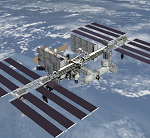The International Space Station (ISS), a result of cooperation between the U.S., Russia, Japan, Canada and the European Space Agency could be the latest victim of terrestrial politics. The U.S. sanctions against Russia, as a result of the Ukraine crisis, are driving apart the two key space powers. Post the Russian annexation of Crimea, the U.S. had imposed sanctions on the Russian space program as well as cut back its cooperation in space and had denied export licenses for hi-tech items. [1] & [2] Russia then responded with sanctions of its own, and barred the U.S. from using Russian supplied engines for launch of military satellites.[3]
A recent report in the Russian government owned RT also suggests that Russia’s federal space agency – Roscosmos may be planning to set up its own space station starting 2017.[4] This means that Russia could walk away from the ISS project after 2020, when its current obligations end. Roscosmos’s departure would spell trouble for the international effort as the Russian Soyuz capsules are the only way of getting astronauts and cosmonauts to the international space station.
In the pre-ISS era, Russia or the erstwhile the USSR had the most extensive experience in operating space stations. The USSR sent up the first orbital space station in 1971 – Salyut-1 (Salute/Fireworks). There were six more stations in the series. The first Indian in space in 1984 – Rakesh Sharma went up in a Soyuz capsule which then docked at the Salyut-7 orbital station where Sharma spent 7 days. Salyut was followed by the larger Mir (Peace/World) orbital station which operated from 1986 to 2001, and held the record for longest continuous human presence in space till 2010, when ISS crossed that mark.
Meanwhile, the third country to send humans to space – China, is building its own space station, Tiangong. The Chinese are going it alone and their space program is not connected with any other space agency or country.
These developments point to a divided space once more, a reversal of détente which began during the Cold War. Space exploration had first started as a ‘race’ between the U.S. and the USSR which later evolved into cooperation. In 1975, the two superpowers had carried out a joint mission in space – US Apollo and Soviet Soyuz docked while in orbit. This had required standardisation of some technologies so that the spacecrafts could work together, a sensible goal in a hostile environment.
Now it seems that space is again going to be divided.
Amit Bhandari is Fellow, Energy & Environment Studies, Gateway House.
This blog was exclusively written for Gateway House: Indian Council on Global Relations. You can read more exclusive content here.
For interview requests with the author, or for permission to republish, please contact outreach@gatewayhouse.in.
© Copyright 2014 Gateway House: Indian Council on Global Relations. All rights reserved. Any unauthorized copying or reproduction is strictly prohibited
References
[1] ‘NASA Suspends Cooperation with Russia over Ukraine Crisis’, RT.com, 2 April 2014. Accessed December 8, 2014. <http://rt.com/news/nasa-suspends-relations-roscosmos-961/>
[2] ‘U.S.-Russia Space Alliance Hits Snags, The Wall Street Journal, 2 December 2014, Accessed December 8, 2014. <http://www.wsj.com/articles/u-s-russia-space-alliance-hits-snags-1417563658>
[3] ‘UPDATE 3-Russia Targets Space Station Project in Retaliation for U.S. Sanctions’, Reuters, 14 May 2014, Accessed December 8, 2014. <http://in.reuters.com/article/2014/05/13/ukraine-crisis-russia-usa-idINL6N0NZ4EA20140513>
[4] ‘Out of ISS: Russia Going Solo with Space Station?’, RT.com, 17 November 2014, Accessed December 8, 2014. <http://rt.com/news/206071-future-russian-space-station/>


